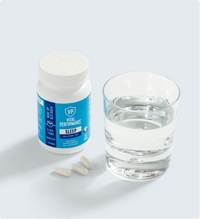Does it feel like you’re always counting sheep to get some Zzz’s to no avail? We’ve been there, which is why we want to share some advice on getting your best sleep ever. And while this won’t necessarily cure your sleep woes, talking to a sleep coach can help. Enter Kelly Murray, award-winning Certified Pediatric and Adult Sleep Consultant and Owner at Kelly Murray Sleep Consulting. She has made it her mission to help bring deep, restorative sleep to your home. Lucky for us, we snagged a few minutes of her time to talk more.
From questions like, “why can’t I sleep?” to “what are the benefits of sleep?” to “what should I do when I can’t sleep?” scroll on to get a pros tips for bringing some sweeter dreams in your future.

Your Top Sleep Questions — Answered!
Below, Murray addresses your top sleep FAQs:
What are the benefits of sleep?
Sleep is not just about restoration. Getting adequate sleep is essential for our mental and physical health and overall well-being. For example, not getting enough sleep impairs our immunity. One study showed that adults who sleep less than 7 hours per night are 3 times more likely to catch a cold. One research-based book published by the Institute of Medicine of the National Archives found that chronic sleep deprivation can also increase our risk for developing physical ailments, such as diabetes, heart disease, obesity, and some forms of cancer. In addition, when we don’t get enough sleep, our bodies think that there is physical danger present and go into fight-or-flight mode, which can lead to heightened anxiety, moodiness and stress. It also makes it difficult to think clearly, react quickly and make decisions, which is likely why sleep deprivation impacts productivity. Studies show for every hour we lose sleep, we lose two hours of productivity the next day.
How much sleep should one get at night?
According to the National Sleep Foundation, adults 18 to 64 years old should get between 7 to 9 hours of sleep a day. Adults over 64 years should get a bit less—7 to 8 hours a day.
Why can’t I sleep even though I’m tired?
For something that is inherently natural, sleep can actually be very complex, so there are usually multiple reasons behind someone not being able to get enough sleep. However, there are some common themes, such as, not waking up and going to sleep at the same time every day, not taking enough time to unwind at the end of the day, poor sleep hygiene (e.g. keeping their room too hot or not blocking ambient light), too much screen time right before bed and not dealing with mental and emotional stress.
Furthermore, medical conditions such as sleep apnea or restless leg syndrome may be the cause. There could also be hidden physical dysfunctions such as poor gut health, low sex hormones, high or low cortisol levels, mineral imbalances or blood sugar regulation issues at play.
There is always a reason. So don’t just write poor sleep off as something you need to accept.

What should I do when I can't sleep?
Here are a few action items, according to Murray:
- Go to bed and wake up within the same 30-minute timeframe every day. This ensures that the hormones that control your circadian rhythm. Melatonin (the sleepy hormone) and cortisol (the alert hormone) ebb and flow in a consistent pattern each day.
- Head outside (without sunglasses) for two to 10 minutes within the first 30 minutes of waking up for the day. This causes your eyes to signal the brain to trigger a surge in cortisol, Murray explains. This will not only boost your energy levels, but allow cortisol to rebound the rest of the day so that it is low at night. In addition, the dose of morning sunlight prompts your body to produce melatonin about 13 hours after exposure to help prepare you for sleep.
- Allow yourself to relax during the day to reduce your stress and cortisol levels. Taking a screen break, going for a walk, getting in a workout or practicing meditation can help you reset and refresh. A jam-packed schedule is stressful for your mind and body, and can lead to high cortisol levels lasting into the evening, which can impair your sleep.
- Take good care of your gut health by eating a diet that is packed full of fiber and low in sugar. Studies have found that most neurotransmitters and hormones that help control and regulate your sleep are made in your gut.
- Avoid bright lights and screens for at least an hour before bed. Light, especially blue light from screens, sends a signal to your body that it is daytime. As a result, it will want to produce cortisol instead of melatonin.
- If you are having trouble falling or staying asleep, don’t just lie there. Get out of bed and do something mundane or relaxing until you feel sleepy again. Once you do, get back into bed. If you continue to struggle, repeat until you fall asleep.

A Round-up Of Our Favorite Vital Proteins® Sleep Products
Boost your snooze with any one of these Vital Proteins(R) products designed specifically to help support sleep.**
Vital Note: This article has been made available for informational and educational purposes only. It is not intended to be a substitute for professional medical advice, diagnosis, or treatment. Always seek the advice of your physician or another qualified health provider with any questions you may have regarding a medical condition. Your licensed healthcare professional can best provide you with the diagnosis and treatment of any medical condition and assist you as well in deciding whether a dietary supplement will be a helpful addition to your regimen.











